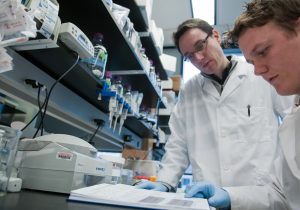Research
IIN awards seed money for convergence research
September 12, 2019

Researchers working to develop novel therapies for brain cancer and other debilitating diseases and disorders
The International Institute for Nanotechnology (IIN), through its Convergence Science & Medicine Institute (CSMI), recently awarded critical seed funding to Northwestern principal investigators working to develop novel therapies to treat brain cancer, a rare form of leukemia, Huntington’s and other debilitating diseases and disorders.
“The CSMI funding allows investigators to collaborate with departments and scientists throughout Northwestern, as well as with researchers at other scientific institutions, to explore new directions in convergence science,” said IIN Director Chad A. Mirkin, the George B. Rathmann Professor of Chemistry at Northwestern. “Most importantly, this investment supports the collection of critical, preliminary data required to secure larger government grants and other funding for more comprehensive analysis.
“With the CSMI grants, investigators have the opportunity to team up and take new ideas that can lead to innovative, sometimes game changing ways of tracking and treating disease to a level where they are competitive in the more conservative funding environment,” said Mirkin.
______________________________________________________________________
‘The CSMI funding allows investigators to collaborate with departments and scientists throughout Northwestern, as well as with researchers at other scientific institutions, to explore new directions in convergence science.’
—Chad Mirkin
______________________________________________________________________
Among the projects funded through the 2019 CSMI awards is a potential new method to deliver treatment to mast cells in aggressive systematic mastocytosis (ASM).

Evan Scott, an assistant professor of biomedical engineering at Northwestern, is working to develop “nanocarriers” to successfully transport drugs directly to mast cells in ASM, “a form of leukemia that currently has few treatment options.
“Through funding from the CSMI, we aim to develop novel strategies to address ASM by combining a versatile slow-releasing nanoparticle delivery system, developed by the Evan A. Scott Research Group, targeting a unique human mast cell receptor, with pre-clinical testing in the Bruce Bochner Lab involving human malignant mast cell lines and a novel mouse model,” said Scott.
Dr. Bruce S. Bochner is the Samuel M. Feinberg Professor of Medicine in the Division of Allergy-Immunology at Northwestern’s Feinberg School of Medicine.
Co-principal Investigator Alexander Stegh, associate professor of neurology (neuro-oncology) and medicine at the Feinberg School of Medicine, along with the Mirkin Research Group, is utilizing the CSMI grant to tackle glioblastoma by utilizing spherical nucleic acids (SNAs) to trigger an immune response against the most deadly form of brain tumor.
“Vaccines, drugs, and modified human cells that activate the immune system against tumor growth can improve the outcomes and prolong the lives of patients diagnosed with some type of cancers, but have failed to provide survival benefits for patients with glioblastoma,” said Stegh.
Spherical nucleic acids (SNAs), nanostructures consisting of ball-like structures with DNA and RNA arranged on the surface of a nanoparticle, can be digitally designed as precise, personalized treatments to shut off genes or cellular activity. Utilizing SNAs, developed by Mirkin, the research team will seek to activate the stimulator of interferon genes (STING) pathway, a major mechanism that regulates immune responses, against tumor tissue.
“We will test the hypothesis that SNA-mediated activation of the STING pathway alone and in combination with FDA-approved immunotherapies, such as checkpoint inhibitors, will effectively kill tumor cells in both cell and animal models,” said Stegh. “These studies will pave the way for testing STING-SNAs in early clinical trials for the treatment of glioblastoma patients.”

In addition, IIN Associate Director Nathan Gianneschi, the Jacob & Rosaline Cohn Professor of Chemistry, received a CSMI grant to study a new first-in-class therapeutic for Huntington’s disease; and Samuel I. Stupp, the Board of Trustees Professor of Materials Science, Chemistry, and Medicine, received funding to advance his research on the discovery of novel immunomodulatory peptide-amphiphile nanostructures for autoimmune diseases.
“These ambitious projects have tremendous potential to prevent and alleviate some of the most debilitating diseases,” said Mirkin. “The IIN is pleased to partner with and support these investigators in their critical research.”
The International Institute for Nanotechnology at Northwestern University is an umbrella organization that represents and unites more than $1 billion in nanotechnology research, education and supporting infrastructure.